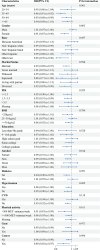Mediterranean diet adherence and risk of kidney stones: Insights from a population-based study
- PMID: 40988191
- PMCID: PMC12459513
- DOI: 10.1097/MD.0000000000044653
Mediterranean diet adherence and risk of kidney stones: Insights from a population-based study
Abstract
This study explored the relationship between the alternative Mediterranean Diet (aMED) score and the prevalence of kidney stones (KSD) among adults in US. This cross-sectional analysis utilized data from the National Health and Nutrition Examination Survey spanning 2007 to 2018. The study population comprised adults aged 20 years and older who provided comprehensive dietary recall information and detailed histories of KSD. Adherence to the Mediterranean diet was quantified using the aMED score, which was divided into 4 quartiles for comparison. To evaluate the association between aMED scores and KSD prevalence, we employed weighted multivariable logistic regression, conducted restricted cubic spline analyses, and performed subgroup investigations. Of the 28,059 participants, 10.08% reported a history of KSD. The weighted mean age (95% CI) was 47.97 years (47.49, 48.45). Males comprised 52.49% (50.08%, 54.90%) of the sample, while females made up 47.51% (45.32%, 49.70%). The restricted cubic spline analysis revealed a negative linear association between the aMED score and the likelihood of KSD development. In a fully adjusted model, individuals in the highest quartile of aMED scores (Q4) were found to have a significantly lower risk of KSD compared to those in the lowest quartile (Q1), with an odds ratio of 0.771 (95% CI: 0.616-0.966, P = .024). An increased aMED score was associated with a lower prevalence of KSD in U.S. adults. This cross-sectional study provides observational evidence suggesting a potential link between dietary patterns and KSD prevalence, which may inform future dietary intervention research.
Keywords: NHANSE; alternate Mediterranean diet score; dietary; kidney stone.
Copyright © 2025 the Author(s). Published by Wolters Kluwer Health, Inc.
Conflict of interest statement
The authors have no conflicts of interest to disclose.
Figures
References
-
- Chewcharat A, Curhan GJU. Trends in the prevalence of kidney stones in the United States from 2007 to 2016. Urolithiasis. 2021;49:27–39. - PubMed
-
- Pearle MS, Goldfarb DS, Assimos DG, et al. ; American Urological Assocation. Medical management of kidney stones: AUA guideline. J Urol. 2014;192:316–24. - PubMed
-
- Liu N, Feng Y, Li J, Ma X, Ma FJ. Relationship between the dietary inflammatory index and kidney stone prevalence. World J Urol. 2022;40:1545–52. - PubMed
-
- Robertson WG, Peacock M, Marshall DH. Prevalence of urinary stone disease in vegetarians. Eur Urol. 1982;8:334–9. - PubMed
Publication types
MeSH terms
Grants and funding
LinkOut - more resources
Full Text Sources




